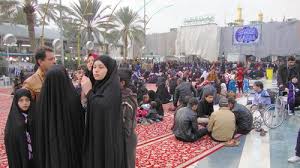
When millions of Shi’ite Muslim pilgrims descended last month on the shrine with twin gold domes in this holy city, many Iraqis expected sectarian fighting to erupt.
Instead, the largely peaceful gathering of more than 17 million Shi’ites provided a place of refuge from violence, with some pilgrims speaking hopefully of an end to this nation’s sectarian clashes.
The road from Baghdad to Karbala, 50 miles to the south, was busy late last week, with army checkpoints crowded and the roadsides littered with stands catering to pilgrims. Many had traveled across the country — some on foot — the week before to mark Arbaeen, the end of the 40-day mourning period for Imam Hussein, the 7th century Shi’ite martyr slain and buried at Karbala.
The bearded image of the imam, a key figure in the historic split between Shi’ite and Sunni Muslims, is everywhere in Baghdad these days: on signs, flags, billboards and banners posted in residential neighbourhoods, outside businesses, police stations, even the morgue.
Those flags also flew last week from roadside stands along the highway south. Nearby buildings pocked with bullet holes were a reminder that a few years ago this area was known as the “Triangle of Death,” the scene of fierce battles between the U.S. military and insurgents.
In the Euphrates Valley farming town of Jurf Nasr, 40 miles south of Baghdad, more images of Imam Hussein appeared, as well as billboards honoring hometown heroes killed battling the Islamic State insurgent group. Baghdad has remained relatively peaceful in recent weeks, but here in the belt of towns surrounding the capital, Iraqi forces and Shi’ite militias are still fighting the Sunni extremists who seized large sections of Iraq during the summer.
Jurf Nasr was once a Sunni town known as Jurf Sakhr, or “rocky bank,” a haven for militants. But for the Ashura holiday during the fall, with Islamic State threatening to slaughter Shi’ite pilgrims as they passed through town toward Karbala, Iraqi security forces and Shi’ite militias launched a two-day assault that chased Sunni families away and left the town a battered and burned outpost. The government renamed the town Jurf Nasr, “the bank of victory.”
On the far side of the Baghdad Belt, Karbala is thriving. There’s a new mall, high-rise hotels and signs advertising expensive developments. The shrine is expanding, as is the one in the nearby Shi’ite holy city of Najaf.
Scores of pilgrims and residents filled the courtyard between the gold domes last week, the women wearing the required head scarves and ankle length gowns, or abayas. Many families slipped off their shoes to sit together on massive rugs, picnicking on falafel and sticky coconut sweets from nearby stands as their children played.
Nahedh Shahid, 38, said he and his Shi’ite family were forced to flee to Karbala nine years ago from Baghdad’s mixed sect neighborhood of Dora after his brother was shot and killed. They still own a house in the capital, but the area is now mostly Sunni and he is afraid to return.
“We feel safe here,” he said as he shared butterscotch candy with his five children in the shadow of the shrine.
Shahid, who works at the Interior Ministry, said the government can take credit for protecting the millions who flocked to Karbala during December. “We consider it a strike against the enemies,” he said, referring to Islamic State.
He doesn’t want to see Iraq divided by sectarianism, splitting off into independent states of Shi’ites, Sunni Arabs and Kurds. He sees Karbala not as a Shi’ite city but as a refuge for the persecuted.
“I wish religious minorities would come to Karbala — it’s safer. We can show the world that DAESH is not the face of Islam,” he said, referring to Islamic State by an Arabic acronym. “This place is like psychological relief for people. When they leave, they feel more secure.”
Many of those displaced by Islamic State have poured into Karbala, including religious and ethnic minorities from northern Iraq.
Seated on the rug nearby was one of the displaced: Muhammad Khalil, 48, whose Shi’ite Turkmen family of 10 was forced to flee the northern town of Tal Afar in June after Islamic State invaded. He said their home was later seized by Sunni neighbours.
He knows at least 10 Turkmen neighbours killed by Islamic State as they made their way south. More than 30 members of his tribe disappeared, he said, including a day-old baby and a 91-year-old man.
A former employee of the Health Ministry, Khalil has not been paid in months. But in Karbala, he said, his family found an apartment and support from the Shi’ite community.
“The people helped us more than the government,” he said, “Our government is weak. We don’t have hope that the government can get us back into our homes.”
Seated near him was Hussein Zaid, 38, of Baghdad, who had volunteered during the summer with the Shi’ite brigades that routed Islamic State in Jurf Nasr. His captain was among the dead memorialized in roadside billboards.
There have been reports in recent days of Shi’ite fighters deserting the front lines because of economic hardship, but Zaid said he and others were decommissioned after the victory in Jurf Nasr and are prepared to return if needed. “If they ask us, I will fight again,” he said as he sat fingering a set of prayer beads.
Zaid said he doesn’t support sectarianism, that he fought to rid Jurf Nasr of Sunni extremists, not all Sunnis.
Just then, a group of Shi’ite men passed, chanting and praying. Behind them, the sun was setting, reflected on the golden domes. The shrine would remain open until midnight without incident.
Zaid said he has faith that the peace maintained here will triumph over sectarianism in the long run.
“I am hopeful. A lot of countries are investing in Iraq, and there is peace in Baghdad and the south,” he said, “We don’t want different states inside Iraq. We want one Iraq.”
R111/112/C